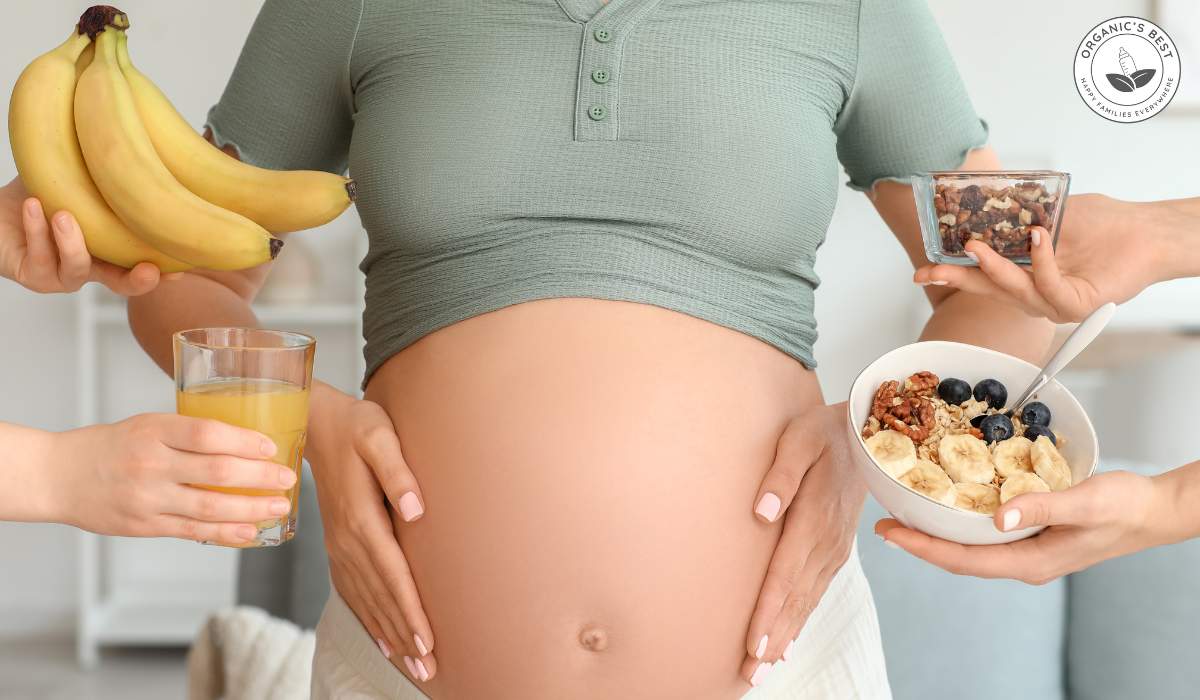Click to Get 2 FREE Boxes/Cans
Only New Customers! Click HERE to Get 2 Extra Boxes/Cans for Free With Your First Order.
BABY FORMULA
Offering new parents top-quality European infant formula from renowned brands like HiPP, Holle, Kendamil, and more. If you’re uncertain about which product to choose, our Formula Finder can help you make the best decision for your baby.
Baby Food
Offering new parents a premium selection of European baby foods, including jars, pouches, cereals, and snacks from esteemed brands like HiPP and Holle.
Pregnancy Diet: Best Foods to Eat While Pregnant
by Agustina Fernandez October 14, 2025 9 min read

Pregnancy is one of the body's most incredible feats, because it is the home of your tiny tot for 9 months as they grow and develop. Through the placenta and umbilical cord, everything a mom eats, drinks, and stores is shared with her growing baby, fueling every heartbeat, brain cell, and tiny toe, but this beautiful exchange also comes with a cost.
When key nutrients like iron or calcium run low, the baby takes what they need first, even if that means drawing from mom's own reserves. It's nature's way of prioritizing new life, but it also means that proper nutrition during pregnancy isn't just important, it's essential for keeping both mom and baby healthy and strong.
With pregnancy symptoms like morning sickness, cravings, and fatigue, it's not always easy to focus on your diet, but being mindful about food choices can really make a difference in how you feel. In this article, we'll dive into the best foods to nourish your body as it works hard to grow new life, including an easy-to-follow Pregnancy Diet Chart to help you plan for the months ahead.
Table of Contents
Pregnancy Nutrition Guide: What to Eat During Different Pregnancy Stages?
A healthy pregnancy diet not only nourishes your growing baby but also supports your own strength, comfort, and well-being throughout this incredible journey. Your meals and snacks during pregnancy should shift with each trimester, since your body and your baby's needs change as development progresses. The right foods can also ease some of the tougher symptoms, like morning sickness and fatigue.
Below, you'll see how certain foods play a part in each trimester. It may be a good idea to check in with a healthcare practitioner, like your gynecologist or a dietician, before proceeding with any significant diet change while pregnant.
First Trimester Diet: (Weeks 1-12)
During the first 3 months, your baby's organs begin to form, making folic acid, iron, and vitamin B6 especially important. Though your calorie needs don't increase much yet, your body is working overtime behind the scenes, so focus on nutrient-dense, easy-to-digest foods. The following foods contain these nutrients in abundance:
-
Folic Acid: Leafy greens like spinach and kale, as well as lentils, beans, citrus fruits, and fortified cereals
-
Iron: Lean red meat, lentils, spinach, quinoa, eggs
-
Vitamin B6: Chickpeas, salmon, chicken breast, potatoes, bananas
This period is also often plagued by the dreaded morning sickness symptom. While it may be hard to eat during this time, keeping food in your tummy may actually help ease nausea and vomiting. It is also very important to stay hydrated, especially if you're struggling to keep fluids down. Remember that your doctor can recommend ways to ease symptoms, like anti-nausea medications that are safe for pregnancy.
The following foods are gentle, light, and nourishing, which is necessary when your stomach feels off:
-
Bananas, applesauce, and dry toast
-
Ginger tea or ginger chews
-
Crackers or rice cakes
-
Smoothies with veggies, berries, and yogurt
-
Peppermint tea or lemon water
 Even with the best intentions and a plate full of healthy foods, it's still possible to miss out on some essential nutrients during pregnancy. That's where a good prenatal vitamin comes in. These vitamins act as a safety net, filling in potential nutritional gaps to support your baby's development and your own well-being.
Even with the best intentions and a plate full of healthy foods, it's still possible to miss out on some essential nutrients during pregnancy. That's where a good prenatal vitamin comes in. These vitamins act as a safety net, filling in potential nutritional gaps to support your baby's development and your own well-being.
It's best to start taking prenatal vitamins before becoming pregnant. In particular, supplementation with folic acid is important for preventing neural tube defects, which lead to abnormal development of a baby's brain and spine. The neural tube forms very early in pregnancy, usually within 3-4 weeks after conception, so it's best to start taking folic acid at least 1-3 months before trying to conceive.
If you follow a vegetarian or vegan diet, or have a health condition that affects nutrient absorption, your healthcare provider might suggest additional supplements to support your diet.
Before reaching for any herbal remedies, check in with your doctor first, as some herbs that are harmless for non-pregnant women can actually interfere with pregnancy or your baby's development.
Second Trimester Diet: (Weeks 13-27)
This second stage is all about growth and development. Your baby's muscles, bones, and organs mature rapidly, and your appetite usually improves as morning sickness subsides.
You'll need extra protein, calcium, and vitamin D to support this burst of growth! This is also the time to maintain a steady iron intake to prevent anemia as blood volume increases.
During these weeks, focus on balanced meals that combine whole grains, lean proteins, fruits, and vegetables to sustain energy and keep your digestion steady. The following foods are great options:
-
Eggs
-
Greek yogurt
-
Lean meats like chicken, turkey, or beef
-
Tofu, lentils, and chickpeas
-
Quinoa, nuts, and seeds
-
Milk, fortified plant milks, and cheese
-
Salmon
-
Leafy greens such as kale, bok choy, and broccoli
-
Eggs
Third Trimester Diet: (Weeks 28-40)
By the final stretch of pregnancy, your baby is gaining weight and storing fat for life outside the womb. Your body also needs extra energy to support labor preparation and fluid retention, so focus on high-fiber foods, omega-3 fatty acids, and staying properly hydrated.
Fiber helps relieve constipation, a common late-pregnancy complaint, while omega-3 fatty acids support brain and eye development. Staying hydrated can reduce swelling, leg cramps, and fatigue. Meals should be smaller but more frequent, as your growing belly can leave less room for large portions.
The following foods offer nutrients to support the final stage of pregnancy:
-
Oats, bran, and whole-grain breads
-
Lentils, beans, and chickpeas
-
Fresh fruits like pears, prunes, and berries
-
Leafy greens and cruciferous vegetables
-
Chia seeds and flaxseeds
-
Fatty fish like salmon or trout
-
Walnuts and flaxseed oil
-
Avocados and olive oil
-
Coconut water and herbal teas for gentle hydration
-
Water-rich fruits like watermelon, cucumber, and oranges
Pregnancy Food Chart
Use this chart, which showcases the best foods for pregnancy, to help plan your pregnancy meals and snacks throughout the next 10 months!

Nutrition During Pregnancy: General Tips
Eating the right foods is important, but sometimes feeling your best also means steering away from perfection, so take these tips with a grain of salt. Some days you'll crave greens, and other days only toast will do, and that's okay! You know your body best, and when in doubt, your doctor should be your go-to. That said, the following tips offer general guidance on nutrition during pregnancy.
-
Eat a Variety of Whole Foods - Focus on fruits, vegetables, whole grains, lean proteins, and healthy fats. Variety ensures you're getting a broad spectrum of vitamins and minerals that support both your health and your baby's development.
-
Don't Fear Healthy Fats - Avocados, nuts, seeds, and olive oil provide essential fatty acids that help your baby's brain and nervous system develop.
-
Keep Protein a Priority - Your body needs extra protein during pregnancy to support your growing baby and placenta. Aim to include a good protein source at each meal, like eggs, yogurt, chicken, beans, tofu, or fish low in mercury.
-
Stay Hydrated - Blood volume increases significantly during pregnancy, so you'll need more fluids than usual. Water should be your main drink, but soups, smoothies, and milk also count toward your hydration goal.
-
Don't Skip Meals - Regular meals help maintain energy and stabilize blood sugar. If morning sickness makes eating hard, try small, frequent snacks instead of three big meals.
-
Take Your Prenatal Vitamin - Even with a healthy diet, it's hard to get enough folate, iron, and DHA from food alone. A prenatal vitamin helps fill those gaps.
-
Watch Your Iron Intake - Iron supports red blood cell production for both you and your baby. Pair iron-rich foods, like spinach, lentils, or beef, with vitamin C sources, like oranges or bell peppers, to boost absorption.
-
Listen to Your Body - Pregnancy hunger is real, and for good reason, so don't limit yourself too much. Eat when you're hungry, and stop when you're satisfied.
-
Limit Empty Calories - Sugar and processed foods can crowd out more nutrient-dense options. Still, pregnancy isn't about perfection; a treat now and then won't hurt. Aim for 80/20, with mostly wholesome foods, and room for comfort foods.
-
When in Doubt, Ask Your Doctor - If you have questions about supplements, allergies, or food safety, your healthcare provider or a registered dietitian can personalize your nutrition plan.
Foods and Substances to Avoid When Pregnant
While there are plenty of tasty foods that you can enjoy, there are also some foods to avoid when pregnant because your chance of miscarriage, premature delivery, or stillbirth can increase if you're exposed to certain bacteria and toxins from them. While the odds are very low, it's better to play it safe. If pregnant, you should avoid the following foods:

-
Raw or partially cooked eggs and meat - These can carry bacteria that may cause food poisoning. Stick to fully cooked eggs to stay safe.
-
Hot dogs and deli meats - These can also harbor harmful bacteria. Always heat them to an internal temperature of 165°F before eating.
-
Alcohol - Even small amounts can affect your baby's development, so you should avoid it completely during pregnancy.
-
Foods high in saturated fat or added sugar - While an occasional treat is fine, try to limit these, as they can contribute to excessive weight gain and other complications.
Safe Pregnancy Snacks and Meal Ideas
Eating well during pregnancy doesn't have to be complicated or boring! The key is to focus on nutrient-rich foods that support your baby's growth while keeping you energized.
Here are some healthy snacks for pregnancy:
-
Fresh fruit with nut butter
-
Yogurt with berries
-
Veggies and hummus
-
Whole-grain crackers with cheese
-
Trail mix
-
Cottage cheese with sliced fruit
-
Hard-boiled eggs with whole-grain crackers
Here are some hearty and healthy options for meals:
-
Omelets with vegetables
-
Grilled chicken or fish with quinoa and roasted veggies
-
Stir-fries with tofu or lean meat
-
Smoothie bowls
-
Whole-grain pasta with vegetables and lean protein
-
Overnight oats with fruit and seeds
-
Stuffed bell peppers with quinoa, black beans, and veggies
-
Grilled fish tacos with cabbage slaw
-
Whole-grain toast with avocado and a poached egg
How to Manage Cravings While Maintaining a Balanced Pregnancy Diet
Experienced mothers know all too well that pregnancy cravings can get in the way of even the most well-planned pregnancy diet plan. Sudden urges for sweet, salty, or crunchy foods are completely normal, as your body is undergoing hormonal changes and working hard to nourish your growing baby.
The good news is that you can satisfy cravings without completely derailing a balanced diet during pregnancy. Rather than ignoring cravings altogether, allow yourself small portions of what you're craving, such as a piece of dark chocolate instead of an entire bar.
You can also look for healthier swaps, fruit, yogurt with honey, or a smoothie can satisfy a sweet tooth, while roasted chickpeas, nuts, or whole-grain crackers can hit the spot for salty or crunchy cravings.
Keeping balanced snacks on hand makes it easier to reach for nutritious options first, and staying hydrated throughout the day can prevent some cravings that are actually signs of thirst. Eating regular, balanced meals with protein, healthy fats, and complex carbs helps stabilize blood sugar and reduce sudden urges for junk food.
Conclusion: Pregnancy Diet Plan
Eating well during pregnancy is about balance, variety, and listening to your body. While cravings, morning sickness, and busy days can make healthy eating challenging, focusing on nutrient-rich foods, staying hydrated, and planning meals and snacks thoughtfully can help you meet your nutritional needs and support your baby's growth.
Remember, perfection isn't the goal; small, consistent choices add up, and occasional indulgences are perfectly fine. Pair a well-rounded diet with prenatal vitamins and regular check-ins with your healthcare provider, and you'll be setting the foundation for a healthy, energized pregnancy!
Answering Your Questions
Prep for the months ahead with these quick answers to some of the most asked questions about nutrition during pregnancy.
At What Stage of Pregnancy is Diet Most Important?
Every period of pregnancy matters, but nutrition is especially crucial during the first few weeks, when your baby's organs, brain, and spinal cord begin to form. That said, your body's nutritional needs continue to evolve throughout pregnancy.
The first 3 months are all about folate and iron for early development; the second focuses on calcium and protein for growing bones and tissues; and the third calls for extra energy and healthy fats to support rapid growth, as well as high-fiber and hydrating foods.
What Foods Should a Pregnant Woman Eat Daily?
Your needs will differ per trimester, but as a general rule, it's best to aim for a balanced plate that includes lean proteins, whole grains, fruits and vegetables rich in vitamins and fiber, and calcium-rich foods and healthy fats.
How Many Calories Should a Pregnant Woman Eat?
You don't necessarily need to "eat for two," but you do need a little extra fuel. Most women need about the same number of calories as they would normally eat until the second and third trimesters, when they need about 300-450 additional calories per day, depending on activity level and pre-pregnancy weight.
What to Not Eat During the Early Weeks of Pregnancy?
Pregnancy food to avoid during the early weeks is that which has a higher chance of harboring harmful bacteria or toxins. Steer clear of unpasteurized cheeses, raw or undercooked meat and fish, deli meats unless reheated, and high-mercury fish. It is also recommended that you limit caffeine, skip alcohol, and always wash fruits and vegetables thoroughly!
How Much Water Should I Drink While Pregnant?
Pregnant women should aim for 8-12 cups (about 2-3 liters) of water each day, with higher amounts if it's hot out or when exercising. Staying hydrated helps maintain amniotic fluid levels and supports your baby's circulation.
|
Disclaimer: Please be aware that this information is based on general trends in babies, and it is not medical advice. Your doctor should be your first source of information and advice when considering any changes to your child’s formula and when choosing your child’s formula. Always consult your pediatrician before making any decisions about your child’s diet or if you notice any changes in your child. Breastfeeding is the best nutrition for your baby because breast milk provides your child with all the essential nutrients they need for growth and development. Please consult your pediatrician if your child requires supplemental feeding. |
Agustina Fernandez
Dr. Agustina Fernandez earned her medical degree from the prestigious Universidad Nacional de Córdoba, Argentina. With a deep-rooted passion for pediatrics, Dr. Fernandez is currently on the path to specializing in children's healthcare. Recently, she has delved into the vital field of infant nutrition. Her research interests include breastfeeding, infant formula, and baby food in little ones’ formative years. Dr. Fernandez's commitment to this area of study underscores her dedication to ensuring the health and well-being of children from their earliest days.
Leave a comment
Comments will be approved before showing up.
Also in Organic Infant Nutrition and Health Blog

10 Winter Activities for Kids and Toddlers
by Agustina Fernandez January 06, 2026 8 min read
Read More
How to Choose The Best Infant Formula: A Guide to EU Organic Formulas
by Agustina Fernandez January 05, 2026 14 min read
Read More
Best Formula for Breastfed Babies 2026 Guide
by Agustina Fernandez January 05, 2026 15 min read
Read More